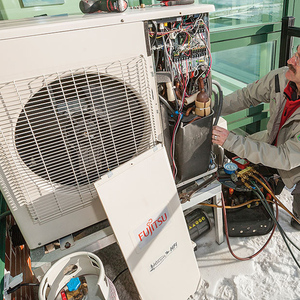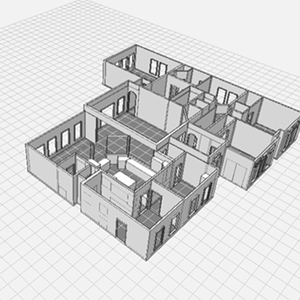I’ll soon be roughing in all new electrical for my remodel. The SEP is live and, due to location, all cables will enter from above and below the box. The panel has a main that can be switched off, but the feeders from the meter base will remain a threat. There is no way to disconnect the SEP entirely without pulling the meter. I’d truly appreciate any tips on dealing with this circumstance, besides the obvious option to have the power company shut off everything.
Any suggestions regarding insulated tools, gloves, etc.?
Does the meter itself have an overprotection device within it? For instance, if one of the knockouts at the top of the panel were to fall and create a short between one of the hot lugs and the neutral bar, would it open the feeder circuit or cause something worse to happen?
Thanks,
Michael
New knowledge is priceless.
Used knowledge is even more valuable.



















Replies
I just hooked up a bunch of new circuits when doing my parents' kitchen. I turned off the main breaker, but the incoming lugs were still hot. Here are my tips, FWIW:
On a lighter note: during this kitchen project, my brother and I were wiring up receptacles. The lines were dead, not even hooked up to the panel yet. My mom decided to take a candid photo, with the flash. Nothing like working on wiring and seeing a bright white flash. Made us both jump, and she didn't know why until we explained it to her.
Then the next day, brother was wiring another receptacle, again, the wires not hooked to the panel, totally dead and safe. Thunderstorm rolled in, big boom of thunder, a white flash, then the power to the whole house went out for about 2 seconds. I think he had to change his underwear after that one!
Be very carefull, and be 100% sure of what you are doing.
Pete Duffy, Handyman
Does the meter itself have an overprotection device within it? For instance, if one of the knockouts at the top of the panel were to fall and create a short between one of the hot lugs and the neutral bar, would it open the feeder circuit or cause something worse to happen?
The meter has no protection device, the distribution xfmr primary does, but may be sized in the 100 kW range (amps depends on dist. voltage).
The worst case in your knockout example is for a big 'arc flash', so wear safety glasses. Generally the short circuit current from the meter is on the order of a few thusand amps, so that will clear most accidental shorts. If you have never seen a short circuit at 2 kA, you will likely experience a large startle reaction, so don't do anything on a ladder.
I have so many screwdrivers and dikes with notches in them (is this where Notchman got his name <G>, never thought of that connotation before) that it is a forgone conclusion some event will happen.
The easiest precaution if you are apprehensive about working near the powered bus feeders is to cover then with wide tape or heavy plastic.
Edit PS: near 100% personal safety is if you stand on a rubber mat and only use one hand, the other in your pocket facing away from any ground, plus hearing protectin and safety glasses. Wearing a rubber suit also helps <G>
Edited 6/20/2007 9:14 am ET by junkhound
The worst case in your knockout example is for a big 'arc flash', so wear safety glasses.
A big arc-flash can sear and set fire to anything within 10' of the front of the panel and could knock someone off his feet. Plastic safety glasses will melt and burn.
So I presume you're warning against a very small arc-flash, enough to throw around some molten metal, singe a beard, etc.
Ed
power company here will pull the meter free and then come back couple hours later and reinstall. just a call thats all
very small arc-flash
Yes, small is what you would get from a short circuit on a 200 A 120/240 service that typically has about only a 2,000 Amp short circuit current - remember, current is limited by the leakage inductance of the distribution transformer, it is NOT unlimited.
Yes, I have seen and insigated many 2000 A arc flashes; the biggest arc flash personally experienced was 4 million amps (EMP testing) - THAT throws some serious metal around.
Remove the meter.
In my county it is allowed and I would guess this is true everywhere. Cut the wire seal and remove meter (hot side lugs first). When you are done, put meter back in (hot side lugs last). I use a red twist tie or copper in place of the seal. when the meter is read again, the seal will be replaced.
You get out of life what you put into it......minus taxes.
Marv
Don't pull the meter without checking with the PoCo first. Some encourage you to do this yourself, others will slap you with a fat fine.
So convenient a thing it is to be a reasonable Creature, since it enables one to find or make a Reason for everything one has a mind to do. --Benjamin Franklin
fireworks,i love them. when that knockout hits i think it will keep arcing until it's out of the way. around here there is nothing to kick between the service cable and the transformer.they do make gloves rated for high voltage but there are high and it still doen't help the "screwdriver arching"
this is a disclaimer:] if you go to jail i'll write......
i usally go ahead and clip the tag on the meter and pull it.when done i just put the meter back and hang the tag so it's not obviuos,it will be ready for the next time. if i get chewed out by the electric company ,oh well.but i have never had them mention it to me that the tag had been cut.
if i only had one wire to hook up i might take a chance but it sounds like you are doing a whole box.i wouldn't want to take the chance. larry
hand me the chainsaw, i need to trim the casing just a hair.
While you're playing with everything, consider adding a disconnect panel next to the meter. It's code here that any upgrades or service changes include a disconnect if there wasn't one in place originally.
All new construction meter bases require the external disconnect.
You might as well include that in your plans. Makes woking on the interior so much easier and safer.
consider adding a disconnect panel next to the meter.
If you do this, you will have to isolate the grounds and neutrals in your breaker box (now a sub panel).You get out of life what you put into it......minus taxes.
Marv
If you pull the meter turn the main breaker off first. The meter connections are NOT designed for disconnecting a loaded circuit.
If you can't/won't pull the meter then you might try to make a sheild with some heavy pasteboard and duct tape or thin bendable plastic.
It won't stop much, but it would keep something like a slug from hitting the hot.
.
.
A-holes. Hey every group has to have one. And I have been elected to be the one. I should make that my tagline.
Edited 6/20/2007 6:40 pm by BillHartmann
You'd think someone would make a rubberized, self-adhesive material for temporarily covering the lugs, etc. You could probably improvise something with roofing membrane or some such, but it should be tested with a megger for conductivity first.
So convenient a thing it is to be a reasonable Creature, since it enables one to find or make a Reason for everything one has a mind to do. --Benjamin Franklin
If you pull the meter turn the main breaker off first. The meter connections are designed for disconnecting a loaded circuit.
I'm assuming you meant "NOT" there:
The meter connections are NOT designed for disconnecting a loaded circuit.
Yes./ I have a bad habit of thinking faster than I type and "not's" and "no's" often get lost..
.
A-holes. Hey every group has to have one. And I have been elected to be the one. I should make that my tagline.
Rule No. 1 is "be careful", but I guess you knew that. ;-)
Working in a live panel box is not really that big a deal. If you need a ladder, use an insulated one. Try not to have two hands in any potential circuit. Make sure the work area is clean, and well lighted & your tools are near at hand. Always be aware of what's hot & what's not. You can turn off the main and that limits the hot points a bit more, but I usually don't, if for no other reason than it usually means working by flashlight. I'd rather see clearly!
The hot busses are pretty well isolated. The two biggest potentials for sparks are the knockouts and pulling the ground wires in. When doing the knockouts, if you're uncomfortable, you can fasten them to the box on the inside with a strip of elec or duct tape. This will help prevent dropping them. I usually try to knock out enough for the whole job at the beginning, so they'll be more accessible and less obstructed by wires. Just tap them in a bit and grab them from the inside with pliers and twist them off, holding on to them tightly with the pliers.
When pulling the wires into the box, I strip them first, get them started and pay close attention to the ground wire. Pull so the wire is kept well free of the box until you get past the stripped part. I then secure the stripped ends outside the box on a nail so they can't bounce around and hit something they shouldn't, and tighten the clamp. Then I carefully cut the ground to length, neatly make whatever bends I need to get it to where it's going, and tighten it to the buss, holding it with needle nose pliers (insulated handles) until it's tight. Repeat with all the other wires. If the new wires will be numerous enough to restrict access to the ground & neutral busses, I'll leave the hots and neutrals until last, connecting up all the grounds first, then neutrals, then hots.
I usually install the breakers and then connect the hots. I find it's easier to keep the wiring neater this way, but you can install the wire to the breaker and then install the breaker into the slot. Neatness counts. Running wires in a hot box is a lot easier if you're not dealing with a pile of red, white and black spaghetti.
Mike Hennessy
Pittsburgh, PA
pull the meter !
.If you can't , do what everyone has said , AND get in the habit of using only one hand in the panel,
keep the other in your pocket or behind you .
keep your head clear and your mouth shut.. don't carry on conversations with the help.
.wear a long sleeve shirt that won't melt
check to make sure there are no combustibles in the area ... have a helper nearby .
..DON'T WORK ALONE
.....make sure you don't have any tripping hazards in case you need to exit the area rapidly....remember which way is OUT
you got a fire extinguisher?
..... the panel is the perfect place to learn how to do ONE thing at a time
and for chrissakes be careful
.
.
.
, wer ist jetzt der Idiot ?
It is really hard to learn this stuff on the internet.
I would suggest that you call the power company and have them pull the meter. Arrange for them to come back and reinstall it.
Back in the low budget movie days, I used to tap hot panels all the time. Junkhound was first with the right idea: Find the hot parts, and cover them well with heavy tape. Gaffer's tape looks like duct tape, but it's about ten times stronger and five times the price. A couple layers of it is all you really need.
-- J.S.
Take off your wedding ring and/or other rings.
Never have seen a good electrician work in a panel with a ring on.
And your watch.
So convenient a thing it is to be a reasonable Creature, since it enables one to find or make a Reason for everything one has a mind to do. --Benjamin Franklin
You could also cut custom sheilds from old inner tubes, and duct tape.
Power before the main breaker is essentially limited only by the size of your power company. Consider it unlimited. A knockout dropped between busses could actually result in an electrical explosion, and arc flash, and at minimum some very dangerous fireworks.
Sure, you can buy tools, etc .... but there is a time to call an electrician. This is one of those times. Owning a scalpel doesn't make you a surgeon.
save way to work in a hot panel, dont touch nothing
"Owning a scalpel doesn't make you a surgeon."
That one's going in my collection of best quotes.
Don K.
<Owning a scalpel doesn't make you a surgeon.>
Aw contrare!
Just last friday I cut the stiches outna' my wifes throat with a utility knife and needle-nose pliers.
She dint even squeal.
Forrest - shoulda' been a surgeon
She dint even squeal.she was proberly afraid you was gonna slit her throat
YEP!
Forrest - not as steady as I used to be
Is this wife one you married or one you made out of spare parts?
Is she "Bride of McDesign"? :>Rebuilding my home in Cypress, CA
Also a CRX fanatic!
Parenting has always been a mix of sage life advice and inexcusable laziness.
<one you made out of spare parts?>
Nah - couldna' done near so nice. Arc flash or no. Hot, yes.
Forrest
I did everything on my house but half of my box is hot and i was scared, so i chickened out knowing my fat little hands would get me in trouble, i traded a friend some roof work and he went and hooked up my breakers, He was scared on the roof so it worked out for both of us.
> I'll soon be roughing in all new electrical for my remodel.
You're putting in a whole new panel? If so, here's the way I approached that.
> Any suggestions regarding insulated tools, gloves, etc.?
Yep, insulated tools; in particular, good quality lineman's pliers and needlenose pliers. Definitely gloves, and they should be flexible enough to let you work easily.
I turned off the main breaker, pulled all the branch circuits out of the box, and marked them with masking tape (#1, #2, etc.). Then I carefully removed one of the main power conductors from the main breaker and taped the exposed end with electrician's tape. Heavily. After doing the same to the other lead, I disconnected the neutral and ground. Then I removed the breaker box and carefully pulled it off the service wire.
I reversed that procedure to get the new panel box in.
> Does the meter itself have an overprotection device within it?
No, it does not. There's a breaker on the nearest transformer (called a "pole pig" where I come from), but it takes a lot to trip it, and you'll knock out the power to several houses if you do. I tripped one once when a wrench slipped. It melted about 1/2" off the end of a 12" crescent wrench and knocked me flat on my butt. I was an interesting experience, but I don't recommend it.
Here, you can get a permit to do the work (if it's your house) and pull and reinstall the meter yourself. The inspector seals the meter again when it's inspected. You might want to check with the power company or local municipality to see if that's legal in your neck of the woods.
My two main precautions (aside from using insulated tools) are
1) work with my left hand in my pocket if at all possible so that in the event of something bad, current isn't flowing through my heart.
2) since my service is in the basement, rather than standing on the concrete, I place a sheet of dry plywood on the floor to insulate myself from the ground.
Remember to respect the juice at all times. IMO, the more you get used to working in a live panel, the more suceptible you are to an accident. In this case fear is a good thing.
One time, I was installing a breaker for our AC & wasn't paying attention as I was pushing the breaker on to the bus. I felt my pinky brush up against the tab on the bus - thankfully I was standing on my trusty plywood, so I didn't get the slightest shock, but it scared me - I could just have easily brushed up against two tabs & fried my hand.